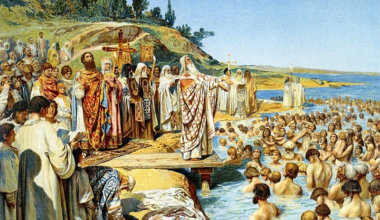
Every couple of years, whenever he declares that he is a ‘cultural Christian’, Richard Dawkins provides a ‘gotcha!’ moment to a whole host of ideologues. That he has expressed this sentiment for at least a couple of decades should suffice in putting to bed the self-congratulatory notion that his latest LBC reiteration is a triumph of Christianity over nonbelief or the death knell for ‘New Atheism’. These claims have been made more frequently recently, owing to Ayaan Hirsi Ali’s recent conversion from atheism to Christianity. In fact, her conversion prompted an open letter by the evolutionary biologist questioning her embrace of Christian beliefs.
Another reason why Dawkins’s LBC interview received backlash was that he set contemporary British Christian culture against Islam, declared his dislike of Ramadan celebrations in Britain, described Britain as a (culturally) ‘Christian country’, and noted that Islam is ‘hostile’ to, for example, gay rights and women’s rights. But again, there is nothing new about Dawkins’s singling out of Islam as being especially problematic today—even many Muslim thinkers concede this. Like Christopher Hitchens before him, he believes that Christianity was just as dangerous as Islam historically (he states as much in his open letter to Hirsi Ali).1 Even so, Dawkins does not limit the simultaneous embracing of a cultural affiliation with a religion and staunch atheism to Christianity, even extending it to Islam in The God Delusion.
The idea that atheism and religious identity can coexist in an individual is hardly groundbreaking. In Sanatana Dharma, or Hinduism, the nirishvaravadi (one who rejects the notion of a divine supreme being) and the nastika (those who reject the divinity of Hindu scripture) not only have the freedom to self-identify as a Hindu, but also have the Vedic, or scriptural, permission to do so. Both Jainism and Buddhism stem from the nastika tradition of Hinduism, rejecting the notion of a creator—albeit still preaching the divine and the supernatural, thus underlining the fluidity of the Indic belief systems. However, while the combination of irreligion with religious culture is natural in syncretic polytheism, pantheism, and non-theism, it is more difficult to envisage in Abrahamic monotheism.
While Jews run the gamut from the ultra-Orthodox to the atheist, all of whom unapologetically lay claim to a Jewish identity, Christianity and Islam are the last bastions of monotheistic rigidity. It is no coincidence that these two became the two largest religions in the world, given the aggressive evangelicalism and the notion of one, absolutist, divine truth common to both. These strategies have since been coopted by political dogmas that establish themselves as quasi-religions, which in recent years can be seen in the rise of Critical Social Justice ideology or ‘wokeism’. The Christian uproar against Dawkins identifying with Christianity owing to his rejection of the Biblical doctrine is no different to the woke repudiation of Dawkins as left-leaning or progressive owing to his blaspheming against gender ideology, for which he has been duly excommunicated by the American Humanist Association. But, of course, these affronts carry a whole different meaning in Muslim countries and communities.
Not only is Islam unparalleled in how it explicitly names other religions as enemies, and in how it reiterates the negation of all other faiths and gods in its daily prayers, but most critically it today remains the only religion that codifies death and violence for thought crimes in numerous states. And yet, despite facing sharia-codified violence, many thinkers for centuries have managed to merge a communal Muslim identity with a rejection of Islamic faith, from Persian alchemists to Turkic physicians to Arab philosophers to Urdu poets in the Indian subcontinent. Granted that self-preservation has been a significant motivation for such thinkers, many also associated with religious culture owing to their desire for uplift and community. This invariably hinges on fighting theological dogma, for it is convenient for the fundamentalists to reject even indigenous voices that self-identify as being outside of the fold as echoers of alien ideas, an allegation customarily launched against the critical thought propounded by many prominent ex-Muslims in recent years.
Furthermore, those who establish theological belief as the definitive feature of religious identity ignore that only a fraction of humankind chooses their faith when they convert from one to another; for the rest, religious identity is just a coincidence of birth, not much different to nationality or ethnicity. Also, if belief were to be used as the determiner, its logical extrapolation would be to presume that all members of the community are adherents of all religious tenets, making all Christians homophobes and all Muslims violently misogynistic. The very reason many have championed a rethinking of the term ‘Islamophobia’ is that it conflates Islam and Muslims, a distinction that many, including Dawkins in his latest LBC interview, maintain is critical so as to protect the expression of critiques against the harmful ideas Muslims and ex-Muslims alike are born into.
State secularism has been, and remains, more critical to human progress than any variation of theism or atheism.
Another much-regurgitated critique of Dawkins’s latest interview, which arguably he has walked into himself, is that by identifying as a cultural Christian, the atheist scholar wants to ‘reap the fruits’ of Christianity without believing in the tree that produced them. When Dawkins calls Britain a ‘Christian country’—regardless of the cultural or communal asterisks—to reject Islamic displays, he inadvertently echoes Christian nationalists and their relegation of Muslims, and members of other religious communities, as lesser members of British society, even if not in the eyes of law. Any secular state, which Dawkins has spent a lifetime advocating for, should neither be Christian, nor Muslim, nor affiliated with any other religion, which is perhaps best achieved by limiting all religious displays to their designated spheres.
This is the crucial difference between people formulating religio-cultural identities and states doing so. State secularism has been, and remains, more critical to human progress than any variation of theism or atheism, and it is the sole guarantor of coexistence for all belief systems and cultures, especially when implemented without any preference for the majority or minority. And it is in secular realms that all orthodox and heterodox identities, including nonbelieving members of monotheistic communities, can find their own spaces to express themselves.
- Hitchens argued that all religions were evil, but not always in the same way or to the same extent at different times; he once said that if he had lived in the 1930s he would view the Catholic Church as the most evil religious force. He was well aware, too, of the many contemporary threats posed by Christian fanatics, and believed that ‘over space and time…[the threat of different religions] tremendously evens out… [And that all religions are] equally rotten, false, dishonest, corrupt, humourless, and dangerous, in the last analysis.’ ↩︎








Your email address will not be published. Comments are subject to our Community Guidelines. Required fields are marked *
Donate